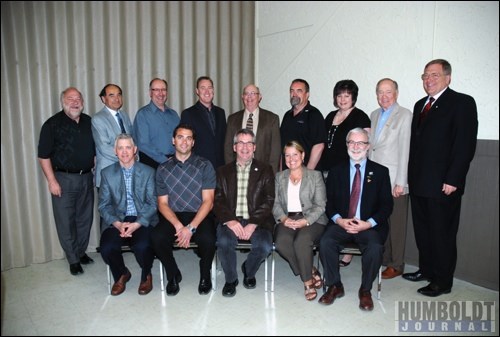They came from all over the province to talk about the issues they all face. Leaders of Saskatchewan's cities gathered in Humboldt for the bi-annual Saskatchewan City Mayor's Caucus May 16-17. Mayors of 13 of Saskatchewan's cities, as well as Warman, which will become a city next year, were present. The only one missing was Pat Fiacco of Regina, though staff of the City of Regina were present at the meetings in his stead.Day one of the mayors' visit to Humboldt was fairly leisurely, as they played an 18-hole round of golf at the Humboldt Golf Course. It was down to business on their second and last day in the city, and the big topics of the day were infrastructure and growth. Jim Scarrow of Prince Albert is the chair of the caucus. He said though the size of the cities varies from quite large to fairly small, infrastructure is always a major topic of concern across the board. "I think at long last people are understanding infrastructure," Scarrow said. 'They are seeing it in their roads, waste water facilities, in their fire trucks... parks... these are all infrastructure issues."Over the past few years, the Mayors' Caucus has been working with the provincial government to get extra funds for operating and for infrastructure, he explained. They were successful in getting one per cent of the Provincial Sales Tax (PST) directed to a municipal operating grant that is provided to the cities on a per capita basis. The next step is working with the government to get some funding for infrastructure. They are hoping to have that funding in place for the coming provincial budget in 2013, Scarrow said. The cities are quite well represented by the provincial government these days, Scarrow indicated, and MLAs are working to resolve issues cities face. "We've done well in our relationship (with the government)," he said. "We have grown in our relationship with them... The government has a strategy for growth and we are here to work with them."The federal government, he added, is not looking at infrastructure programs until 2015, but they have promised to discuss a federal infrastructure program involving matching funds between municipalities, provinces and the federal government. New infrastructure, he noted, will be needed in Saskatchewan to deal with future growth, which was another big topic of discussion among the mayors gathered in Humboldt. Scarrow is convinced that the province - and the Humboldt region in particular - hasn't seen anything yet in terms of growth - nothing like they will see once BHP Billiton opens a new potash mine near Jansen. The City of Humboldt will only be a half-hour from the mine, Scarrow noted, and while it will likely benefit from an increase in population, it will not be compensated by the mine in any way for any issues that arise due to rapid growth. Humboldt, he said, has to be able to attach itself to a revenue source so the taxpayers here are not underwriting the cost of the mine.Humboldt's own mayor, Malcolm Eaton, was happy to show off his community to the other mayors. There were many comments, he said, about how beautiful the golf course is, and how attractive and well laid-out the town is. The meetings, he added, had gone very well. "As Mayor Scarrow said, we have a good relationship with the provincial government," Eaton said. "We're trying to provide positive support and input to policy and legislation benefiting the people of our communities."At their meetings, the mayors were also simply sharing information among themselves, talking about issues that have cropped up and how they have dealt with them. "(We talk) about all the things we all deal with," Eaton said. "Everyone is trying to look for innovative solutions to things."The mayors are all members of a group called Communities of Tomorrow, which is based out of the University of Regina. They had representatives at the meeting to talk about some of the research they're working on. Recycling, regional relations, housing and a tax deferral program recently adopted by Saskatoon were all under discussion at the meeting as well. "Anything that any city is involved in.... We have very common interests, very common problems," Eaton said, and it's good to get together to find out who did what to solve what issue; what worked and what didn't work. "You can learn a lot about what other communities are doing," he said.




